Energy Security: Policy Challenges and Solutions for Resource Efficiency » książka
topmenu
Energy Security: Policy Challenges and Solutions for Resource Efficiency
ISBN-13: 9783030010324 / Angielski / Twarda / 2018 / 278 str.
Kategorie:
Kategorie BISAC:
Wydawca:
Palgrave MacMillan
Język:
Angielski
ISBN-13:
9783030010324
Rok wydania:
2018
Wydanie:
2019
Ilość stron:
278
Waga:
0.51 kg
Wymiary:
21.0 x 14.8
Oprawa:
Twarda
Wolumenów:
01











